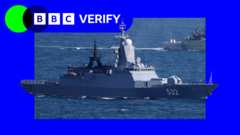Estonia has stepped up naval security to protect its Estlink 1 undersea power cable following suspected sabotage attributed to Russian vessels. NATO has promised increased military presence in the Baltic, as officials assess the severity of the situations affecting key energy links between Estonia, Finland, and beyond.
Estonia Enhances Naval Security for Undersea Power Links Amid Sabotage Fears

Estonia Enhances Naval Security for Undersea Power Links Amid Sabotage Fears
In response to recent damage to undersea power cables, Estonia dispatches a patrol ship to safeguard critical energy infrastructure as NATO boosts its presence in the Baltic Sea.
Amid rising tensions in the Baltic Sea, Estonia is ramping up defense measures to protect its critical undersea power cables after recent sabotage incidents have triggered security concerns. The Estonian military has dispatched the patrol ship Raju to monitor and secure the Estlink 1 power cable, which remains operational but vulnerable following damage to its counterpart, Estlink 2.
Recent developments have drawn attention after a vessel identified as Eagle S was implicated in the severing of the Estlink 2 cable, a crucial 170km link between Estonia and Finland. In the wake of these allegations of sabotage, the Finnish Coast Guard intervened, boarding the suspected oil tanker and guiding it into Finnish territorial waters for further investigation. According to the European Union, the Eagle S is considered part of a “shadow fleet” allegedly used by Russia to bypass sanctions imposed due to its ongoing military actions in Ukraine.
Estonian Defence Minister Hanno Pevkur confirmed that Raju departed to ensure the security of undersea infrastructure and maintain uninterrupted service for consumers in Estonia. Pevkur also expressed optimism regarding possible collaboration with Finland in securing the remaining operational cable. NATO Secretary General Mark Rutte remarked on social media that consultations were underway with Finnish President Alexander Stubb to bolster NATO’s military presence in the area, ensuring mutual assistance among member states.
Estonia’s Prime Minister Kristen Michal indicated a willingness to invoke Article 4 of the NATO Treaty, which permits consultations between members for collective security, if the situation escalates. Recent cable disruptions, including the disruption of two data cables in the Baltic within a month, have heightened urgency, prompting calls for NATO reinforcements to deter further attacks.
As the situation develops, officials have pointed out the challenges of protecting undersea infrastructure continuously, acknowledging past incidents involving suspected sabotage from various vessels, including those reportedly tied to China. Despite concerns over energy security, the Prime Minister reassured citizens of reliable power supply systems, with sufficient backup mechanisms in place.
As investigations into the circumstances surrounding the incidents continue, Finland and Estonia are expected to enhance their cooperative defense strategies in light of the evolving threat landscape in the Baltic region.























